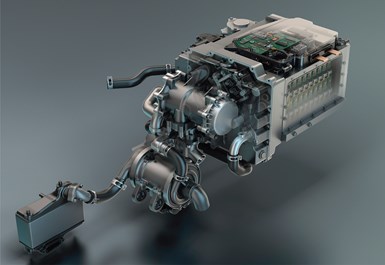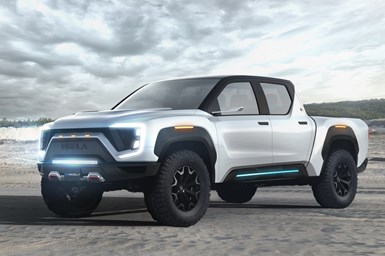GM, Nikola Revise Plans...Sans Electric Pickup and Equity Stake
New agreement focuses on heavy-duty trucks
Nikola has dropped plans for its Badger electric pickup truck after a proposed agreement with General Motors, which was to build the truck and supply its battery and fuel cell technology for it, fell through.

GM Hydrotec fuel cell system (Image: GM)
Instead, the companies announced a new memorandum of understanding to collaborate on Nikola’s planned Class 7/8 semi-trucks.
This supersedes and replaces the “strategic alliance” Nikola and GM announced on Sept. 8. That deal, which began unraveling a few weeks later, was to include a GM equity investment and engineering services deal worth as much as $2 billion into the Arizona-based startup.
Bigger Model, Smaller Deal
The revised plan calls for GM to supply its Hydrotec fuel cell system to Nikola’s previously announced heavy-duty trucks. The companies still need to work out the “appropriate scope of services” that GM will provide to integrate the fuel cell system into Nikola vehicles.
GM says Nikola is expected to pay for any upfront capital investment needed to add production capacity. The Hydrotec stack will be engineered at the carmaker’s technical centers in Pontiac and Warren, Mich., and manufactured at its nearby Brownstown Charter Township battery plant.
The companies also will discuss the potential for GM's to supply its Ultium battery for use in Nikola’s heavy-duty trucks.
As previously announced, Nikola plans to begin testing production-engineered prototypes of the fuel-cell powered trucks by the end of 2021. This will be followed by beta testing in the first half of 2022.
"Heavy trucks remain our core business, and we are 100% focused on hitting our development milestones to bring clean hydrogen and battery-electric commercial trucks to market,” declares CEO Mark Russell. “They are more efficient than gas or diesel and are lightweight compared to batteries for long hauls."
Yeah, But What About the Badger?
The proposed Badger deal was a more interesting and substantial proposition.

Nikola Badger (Image: Nikola)
At the time the initial agreement was announced, Nikola estimated the deal could save it $5 billion over the next 10 years by tapping into GM’s engineering, testing and manufacturing expertise.
Touting GM and his own company’s combined prowess, Nikola founder Trevor Milton summed up the potential collaboration this way: “You couldn’t dream of a better partnership than this.”
Milton was ousted less than two weeks later in the wake of fraud allegations pertaining to the Badger’s capabilities and how far along it was in the development process. Milton and Nikola have repeatedly denied the charges.
On Sept. 30, Nikola postponed the unveiling of the Badger that was to take place in early December and delayed the proposed agreement with GM. Both companies remained outwardly optimistic and vowed to continue negotiations, with a deadline set for Dec. 3.
Ultimately, they didn’t need quite that long to reach a decision. Without the cash infusion from GM, Nikola was forced to pull the plug on the Badger, which it had hoped to launch by as early as 2022.
What’s Next?
The new deal also is a non-binding MOU. No timetable was provided to finalize the agreement.
But the truck program appears to have a much better chance for success, albeit on a smaller scale. It doesn’t require an upfront investment from GM and is much further along the Badger.
RELATED CONTENT
-
When Automated Production Turning is the Low-Cost Option
For the right parts, or families of parts, an automated CNC turning cell is simply the least expensive way to produce high-quality parts. Here’s why.
-
Robotic Exoskeleton Amplifies Human Strength
The Sarcos Guardian XO Max full-body, all-electric exoskeleton features strength amplification of up to 20 to 1, making 200 pounds—the suit’s upper limit—feel like 10 pounds for the user.
-
The Koenigsegg Jesko Has An Amazing Engine
It is hard to believe that this is a vehicle in “serial” production with such extraordinary powertrain performance








